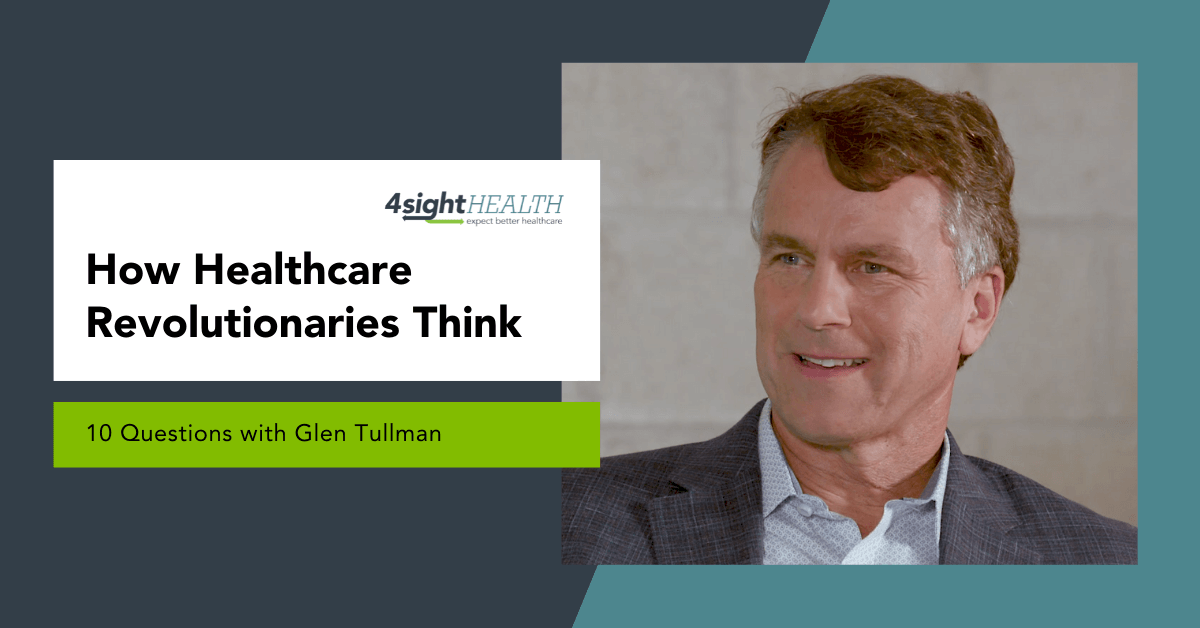November 2, 2021

How Healthcare Revolutionaries Think: 10 Questions with Glen Tullman
Welcome to the latest installment of 4sight Health’s monthly series, How Healthcare Revolutionaries Think. Our interview series profiles healthcare instigators who believe that outcomes matter, customers count and value rules.
If you run in health IT, digital health and/or virtual care circles, Glen Tullman needs little introduction. After leaving his CEO position at Allscripts in 2012, Tullman founded the healthcare venture capital firm 7wireVentures in 2013, founded the chronic care management company Livongo (which is now part of Teladoc) in 2014, and earlier this year joined Transcarent, a consumer-facing health management platform, as CEO. Oh, and earlier this month, Tullman became executive chairman of the board of directors at Zerigo Health, a 7wireVentures’s portfolio company that uses light therapy to enable consumers to treat chronic skin conditions at home.
To say the least, Tullman is on a roll. This fact was evident at the recent HLTH conference in Boston, where Tullman and Jonathan Bush (cofounder and former CEO of Athenahealth; now founder and CEO of Zus Health) gave an engaging and entertaining retelling of their respective journeys through the healthcare technology and digital health landscape to a packed house.
I caught up with Tullman at HLTH in Boston and asked him about what’s going on inside his head now.
1. Glen, how would you define a healthcare revolutionary?
Tullman: I guess I would define a healthcare revolutionary in two ways. First, it’s someone who truly puts consumers at the center of healthcare. Second, that someone also is willing to take on the status quo where the system doesn’t operate effectively to promote better healthcare. When you put the two together, it’s really a totally different way of thinking, a different way of looking at a problem that needs to be solved in healthcare.
2. Given that definition, who’s your favorite healthcare revolutionary, past or present?
 Tullman: Well, unfortunately, I don’t have one because I think we’ve had very little from the standpoint of real revolutions in healthcare. When we talk about health, we can talk about CRISPR or about vaccine development. I mean, we have the best medicine in the world in the U.S. We have the doctors, and we have the nurses as demonstrated by our response to COVID. But, unfortunately, we haven’t been able to mobilize that in a delivery system that gets everyone world-class care. So, sadly, unlike other industries where I can name lots of people, in this industry, we haven’t yet had people who dramatically change the delivery of care.
Tullman: Well, unfortunately, I don’t have one because I think we’ve had very little from the standpoint of real revolutions in healthcare. When we talk about health, we can talk about CRISPR or about vaccine development. I mean, we have the best medicine in the world in the U.S. We have the doctors, and we have the nurses as demonstrated by our response to COVID. But, unfortunately, we haven’t been able to mobilize that in a delivery system that gets everyone world-class care. So, sadly, unlike other industries where I can name lots of people, in this industry, we haven’t yet had people who dramatically change the delivery of care.
3. I was going to ask you if you consider yourself a healthcare revolutionary, but if there are none, I won’t. What do you consider yourself?
Tullman: Well, I guess I would consider myself a healthcare disruptor. But revolutionary? I’m not sure. Maybe some others think of me that way. I would not put that label on myself. But if it means causing disruption, I’d say OK. I would proudly wear that badge, knowing that it’s not really about one person. It’s about a team. And it’s not because we think so. It’s because others tell us.
4. What’s been your best disruptive idea to date?
Tullman: I think the best disruptive idea so far has been the idea behind Livongo. We believed that we could improve the customer experience, improve clinical outcomes and lower the cost of care. With the data, we proved that we could do all three things with the right delivery model. That was magical. If you go further back, I’d say e-prescribing, which we did through Allscripts. That’s how Allscripts started, and most people don’t understand that. Before that, doctors were using those little script pads to write out prescriptions and giving them to patients to give to their pharmacist. There were a lot of mistakes, and people died from preventable medication errors. Once we put in electronic prescribing, the number of preventable deaths from medication errors actually dropped. It was a real game changer.
5. What’s been your worst disruptive idea to date or one whose time hasn’t come yet or one that just tanked after you tried it?
 Tullman: I get that question a lot. People ask me, “What’s your biggest mistake or your worst idea?” The answer is “I make them every day.” If you’re trying to innovate every day, you’re trying a lot of new things, and most of them aren’t working. The best basketball players miss more shots than they make. The best baseball players make more outs than get hits.
Tullman: I get that question a lot. People ask me, “What’s your biggest mistake or your worst idea?” The answer is “I make them every day.” If you’re trying to innovate every day, you’re trying a lot of new things, and most of them aren’t working. The best basketball players miss more shots than they make. The best baseball players make more outs than get hits.
So, I think the answer is we’ve tried a lot of things. When you try them, and they don’t work, then pivot. Don’t stick with a bad idea. Acknowledge it and move on to the next idea. That’s literally part of the beauty of technology is that we can try five different things a day through A/B testing, and the ones that work we keep, and the ones that don’t we stop.
6. You’re healthcare’s “it person” right now, kind of like a movie star with a string of hit movies. Do you feel the pressure to make another hit movie? Does that weigh on you because people are expecting something big each time?
Tullman: If I didn’t feel the pressure, people would make sure I felt it. But I put the pressure on myself. My motivation isn’t to build another financially successful company. My motivation is to solve problems in healthcare that we haven’t solved yet. We solved a piece of it with e-prescribing. We solved a piece of it with chronic-care management. But care is still too expensive, and we’re not getting the outcomes we deserve. I don’t really think of it as pressure. I think of it as more of an opportunity. We were given tools to solve these problems, and we have a responsibility to use them to make people’s lives better because their health is better. That’s an honor, and it is important work to do.
7. Well, you do have the Midas touch right now, or at least people think you do. Do you have more best friends than ever now? Do people try to hook their wagon to your star? Are they calling you up with all kinds of ideas? Are they following you out of the room after you speak at an event?
 Tullman: There is some of that. No doubt. But look, there is an interest in what we’re doing, and people want to share their ideas with us, not just because of what we’re doing at Transcarent, but because of our venture capital firm. Young entrepreneurs are excited to tell us what they’re doing, and that’s great. I just have to find a balance. There are only so many hours in a day, and it’s a challenge to manage all of the emails. But I’m not unique. There are a lot of people in the same situation. I try to talk with as many people as I can and stay open to ideas. It was not too long ago that that was me. I was trying to capture someone’s ear. We have to remember where we came from.
Tullman: There is some of that. No doubt. But look, there is an interest in what we’re doing, and people want to share their ideas with us, not just because of what we’re doing at Transcarent, but because of our venture capital firm. Young entrepreneurs are excited to tell us what they’re doing, and that’s great. I just have to find a balance. There are only so many hours in a day, and it’s a challenge to manage all of the emails. But I’m not unique. There are a lot of people in the same situation. I try to talk with as many people as I can and stay open to ideas. It was not too long ago that that was me. I was trying to capture someone’s ear. We have to remember where we came from.
8. You mentioned your venture capital firm, 7wireVentures. How does running that affect how you think, how you work or how you see the market?
Tullman: I’m fortunate to have a broad range of interests and hobbies. One of my hobbies is building companies. Working at 7wireVentures allows me to look at the best companies and the best ideas that are out there. Some we can incorporate into Transcarent. We can provide funding for others. It’s a source of energy for me—all the new ideas from all these entrepreneurs. It doesn’t sap my energy. People say, “You’re working all the time.” I say I’m having fun.
9. 7wireVentures is a catalyst for healthcare innovation. Let’s talk about the flip side. What’s the biggest barrier to healthcare innovation?
Tullman: We’ve created a structure that has on one side, all of us healthcare consumers who pay for their care and self-insured employers. On the other side are all the providers who provide the care. But in the middle, we have this enormous bureaucracy of payers and PBMs (pharmacy benefit managers) and all kinds of people and suppliers and distributors who make enormous amounts
of money from all the friction and inefficiencies in the system.
Any time you want to do something that would reduce the friction or make things efficient, you’re up against it because you’re taking money away from someone in the middle. That’s the biggest barrier. Now, I’m a capitalist. But making billions of dollars in profit in one quarter during a pandemic largely by denying care is unconscionable. That’s a very short-term and short-sighted strategy that leads people to say we need the government to run the healthcare system.
10. Last question, Glen. When are you done, and how will you know it?
Tullman: I’ll quote Bill Gates. He said, “If I’d had some set idea of a finish line, don’t you think I would have crossed it years ago?” There isn’t a finish line for me, and I love what I do. I guess if there were ever a time that I stopped linking what I was doing, then I would do something else.
Burda’s Final Bit
Here’s my take. What’s good for customers is good for business. The same is true in healthcare. But we forget who the customer is. It’s the consumer. It’s the person who’s healthy and wants to stay that way. It’s the person with a chronic illness who wants to stay as healthy as possible. It’s the person who’s sick and wants to get better if not stay alive. I get the sense that Tullman gets it. He’s
a businessman to be sure, a very successful one at that, and he clearly is enjoying his hot streak. But he knows that the path to that success starts with the customer. Let’s hope he stays on course.
Glen Tullman, Chief Executive Officer of Transcarent
 Glen Tullman is the Chief Executive Officer of Transcarent, the first comprehensive, consumer-directed health and care platform for employees of self-insured employers and their families. Born in Silicon Valley, Transcarent’s platform empowers consumers with the kind of information, guidance and access that leads to better care, better outcomes, and more cost-effective decisions for everyone.
Glen Tullman is the Chief Executive Officer of Transcarent, the first comprehensive, consumer-directed health and care platform for employees of self-insured employers and their families. Born in Silicon Valley, Transcarent’s platform empowers consumers with the kind of information, guidance and access that leads to better care, better outcomes, and more cost-effective decisions for everyone.
Tullman is the former Executive Chairman, Chief Executive Officer, and Founder of Livongo Health, the first at-scale consumer digital health company to truly empower people with chronic conditions to live better and healthier lives using data science.
In his final year, he led Livongo through the largest consumer digital health Initial Public Offering in history, a secondary offering, a convertible debt offering that raised over $550 million, and the industry’s largest merger to date between Livongo and Teladoc Health, valuing Livongo at $18.5 billion and beginning a new era of consumer centric virtual care.
A visionary leader and entrepreneur, Tullman previously ran two other public companies that changed the way health care is delivered. During his time as Chief Executive Officer of Allscripts, the Company was the leading provider of electronic prescribing, practice management, and electronic health records. Glen led Allscripts IPO and Secondary offerings. Prior to Allscripts, he was Chief Executive Officer of Enterprise Systems, the leading resource management systems for hospitals, which he also took public and then sold to McKesson/HBOC. Before entering healthcare, Tullman served as President and COO of CCC Information Systems, a provider of computerized systems for the property and casualty insurance sector.
Tullman is also one of two Founding Partners at 7wireVentures, one of the highest returning venture capital funds in Illinois. He is the author of On Our Terms: Empowering the New Health Consumer, in which he proposes new solutions to address the chronic-condition epidemic facing our country.
Read More Healthcare Revolutionary Interviews
- February: Gaurov Dayal, M.D.
- March: Thompson Aderinkomi
- April: Jon Pearce
- May: Kurt Waltenbaugh
- June: Robert Pearl, M.D.
- July: Scott Powder
- August: Jeff Jones
- September: David Greenberg and Dave Jacobs





